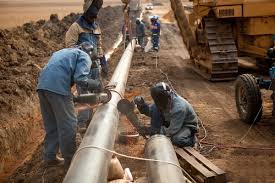The Nigerian National Petroleum Company Limited (NNPCL) has unveiled plans to invest in and deploy high integrity crude oil and gas pipeline infrastructure nationwide as part of its sustained efforts to protect the critical assets from attacks by criminals.
To achieve this goal, the Group Chief Executive Officer (GCEO) of the company, Mele Kyari, on Thursday disclosed that the management, in collaboration with the company’s partners, would be making significant investments in technology to upgrade the existing oil and gas transportation infrastructure to ensure that standard aligns with modern trends in the sector.
Kyari, who made these remarks at the 2024 edition of the Nigeria International Pipeline Technology and Security Conference (NIPITECS) organised by Pipelines Professionals Association of Nigeria (PLAN) and held in Abuja, said the upgrade would involve the use of fibre optic technology, geo-tagging/sensing technology, radio frequency, among others.
Represented at the event by the Managing Director of Nigerian Pipelines and Storage Company Limited (NPSCL), Folorunso Kareem, the Group’s CEO explained that the NNPCL had eight pump stations, located at Abaji, Abudu, Auchi, Biu, Izom, Lokoja, Sarkin Pawa, and Zaria, to ensure desired flowrate and pressure, as well as 22 product depots/terminals and one crude oil terminal in Escravos.
He disclosed that the NPSCL had implemented a programme to guarantee the reliability of the pipelines, including the repair of pipelines and use of security and maintenance contracts, adding that since 2016, NNPCL has an incentivised contract with a security company for provision of security and maintenance services.
Kyari explained: “The contractors are also responsible to perform minor repairs to stop leakages. Contractors are penalised for leakages over one per cent. As a result, the leakage on pipelines is aligned with industry standards. Crude lines to Warri and Port Harcourt experience less than one per cent leakage.
“The new strategy is to construct high integrity, low risk pipelines as well as new engineering solutions (HDD) to bury pipelines deeply in high risk areas. Then new technology solutions for monitoring and management-fibre optic technology, geo-tagging/sensing technology, radio frequency, etc”, he added
According to him, the project will be financed through private investment to construct the pipelines through Build Operate and Transfer (BOT) model, which will ensure return on investment provided through a throughput fee.
He said: “The throughput fee would be higher than the current costs of security and losses. Pipelines play a critical role in achieving national economic development and environmental sustainability.
“They serve as the backbone of a country’s energy infrastructure, enabling the efficient and safe transportation of essential resources such as oil, natural gas, and refined petroleum products.
“NPSC with the largest petroleum product pipeline network in Africa is poised to contribute to the nation’s energy security, industrial productivity, and overall economic growth.”
In his keynote address at the forum, Minister of State for Petroleum (Gas), Ekperikpe Ekpo, pointed out that for a resource-rich country like Nigeria, pipeline assets had been helpful in driving economic growth, facilitating energy access, and promoting industrial development.
Ekpo lamented, however, that despite the economic potential of the assets, they remained highly vulnerable to vandalism, sabotage, and theft with the attendant negative implications in terms of loss of revenue, environmental degradation, and threat to national security.
He assured that “this administration will continue to develop and deploy new strategies to ensure pipeline security remains at the highest level. This will involve adopting innovative technologies, refining security protocols, and fostering stronger cooperation amongst stakeholders to address emerging threats effectively.”
Currently, available data shows that NNPC has over 5,120 kilometres of pipeline network nationwide for supply crude oil to the state-owned refineries and evacuate refined products for distribution across storage depots. However, a substantial part of the pipelines had been vandalized, leading to huge loss of revenue to the country.






